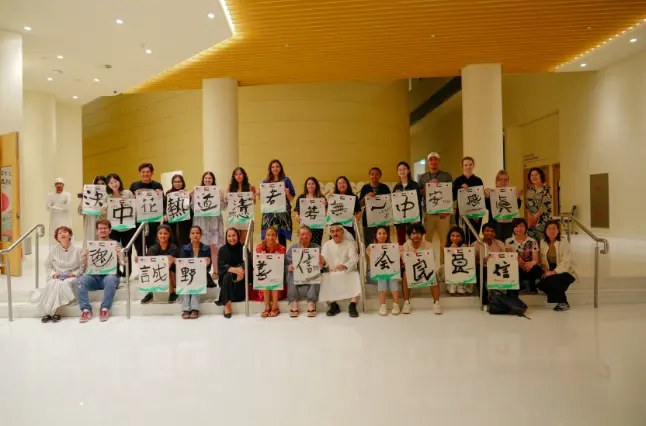Khawla Art and Culture, in collaboration with the Japanese Embassy, organised a workshop featuring the Japanese calligrapher, Juichi Yoshikawa, at New York University (NYU) Abu Dhabi, with the attendance of more than 25 participants, including students, talented individuals, and art enthusiasts, as well as Emirati calligrapher Mohammed Mandi.
The workshop, held as part of the ongoing Art of Calligraphy Exhibition organised by Khawla Art and Culture at its Abu Dhabi headquarters, included a presentation of Yoshikawa’s artworks, showcasing the evolution of Arabic and Japanese calligraphy from ancient scripts to modern letterforms.
The workshop sparked significant interactions among students and calligraphers, aiming to refine young talents.
Additionally, Khawla Art and Culture hosted, in coordination with the spouse of the Japanese Ambassador to the UAE, a tour for 20 spouses of ambassadors from various countries, which featured key exhibits. This was followed by a dialogue session and an art workshop featuring Yoshikawa.
H.H. Sheikha Khawla Bint Ahmed Khalifa Al Suwaidi, wife of H.H. Sheikh Tahnoun bin Zayed Al Nahyan, Deputy Ruler of Abu Dhabi, Founder of Khawla Art & Culture, affirmed the UAE’s growing status as a global hub for thinkers and creators, as it is witnessing a burgeoning cultural scene.
She also highlighted the workshop’s role in encouraging active participation in the country’s cultural development. The workshop aimed at engaging artists and experts across various cultural domains, with an emphasis on promoting calligraphy art and nurturing young talents with the latest knowledge in artistic and cultural areas. This will help enhance youth creativity and deepen understanding of all forms of arts and cultures.
Sheikha Khawla further said that calligraphy has played a significant role throughout history in documenting knowledge and fostering cultural exchange. It has facilitated cultural dialogue among nations and civilisations while enhancing global communication.
Hosting such workshops is in line with Khawla Art and Culture’s commitment to highlighting the importance of handwritten text, teaching future generations various writing styles across multiple languages, and promoting linguistic diversity and intercultural understanding within society.

